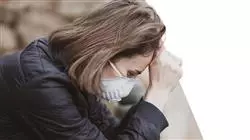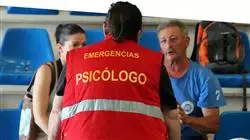University certificate
The world's largest faculty of psychology”
Introduction to the Program
A program focused on the concept of stress triggered by a critical situation with which you will be able to improve your professional skills in psychological intervention in a 100% online way"

The emotional tension generated by an extreme or critical situation causes an imbalance in the production of cortisol, glucocorticoids and adrenaline, whose levels shoot up, favoring the appearance of the feeling of stress. The inability to manage this reaction can seriously affect the health of the victim and their organism, favoring the appearance of diseases related to the cardiovascular, immune or endocrine system, as well as disorders that condition their psychosocial development, such as anxiety or depression.
That is why the prompt intervention of psychology professionals is essential, not only to address the situation based on the patient's needs, but also to provide the keys to manage their emotions and thereby avoid a deterioration of their cognitive-behavioral condition due to post-traumatic stress. However, as this is an area of ongoing research, many professionals find it difficult to keep up to date. For that reason, TECH and its team of experts have considered it necessary to develop a qualification that gathers the latest information related to the human response to stress.
As a result, this 100% online Postgraduate certificate, through which graduates will be able to delve into the concept of this feeling, as well as the after-effects of this condition and the most innovative and effective therapeutic techniques for its management and prevention, has been created. All this through 150 hours of diverse content, including practical cases based on real situations, so that professionals, in addition to increasing their knowledge, can improve, in a guaranteed way, their skills in psychological intervention in critical situations.
Knowing in detail the best strategies for the management of post-traumatic stress will allow you to help your patients in the prevention of diseases related to this feeling"
This Postgraduate certificate in Concept of Stress and the Aftermath of the Critical Situation contains the most complete and up-to-date program on the market.
- The most important features include:
- The development of case studies presented by experts in Psychology and Emergency Services and Emergency Services
- The graphic, schematic, and practical contents with which they are created, provide scientific and practical information on the disciplines that are essential for professional practice
- Practical exercises where the self-assessment process can be carried out to improve learning
- Its special emphasis on innovative methodologies
- Theoretical lessons, questions to the expert, debate forums on controversial topics, and individual reflection assignments
- Content that is accessible from any fixed or portable device with an Internet connection
Could you identify the differences between stress and anxiety? With this Postgraduate certificate you will work on each of them, as well as on the best strategies for their prevention”
The program includes, in its teaching staff, professionals from the sector who bring to this program the experience of their work, in addition to recognized specialists from prestigious reference societies and universities.
Its multimedia content, developed with the latest educational technology, will allow professionals to learn in professionals a situated and contextual learning, i.e., a simulated environment that will provide immersive education programmed to prepare in real situations.
The design of this program focuses on Problem-Based Learning, by means of which professionals must try to solve the different professional practice situations that arise during the academic course. For this , purpose, students will be assisted by an innovative interactive video system developed by renowned experts.
You will delve into the different types of stress that have been identified to date, as well as the keys to diagnose them and the most effective therapeutic tactics to treat them"

If you are interested in the biological and biochemical response to stress, this program also delves into the alteration of the organism from the physical point of view"
Why study at TECH?
TECH is the world’s largest online university. With an impressive catalog of more than 14,000 university programs available in 11 languages, it is positioned as a leader in employability, with a 99% job placement rate. In addition, it relies on an enormous faculty of more than 6,000 professors of the highest international renown.

Study at the world's largest online university and guarantee your professional success. The future starts at TECH”
The world’s best online university according to FORBES
The prestigious Forbes magazine, specialized in business and finance, has highlighted TECH as “the world's best online university” This is what they have recently stated in an article in their digital edition in which they echo the success story of this institution, “thanks to the academic offer it provides, the selection of its teaching staff, and an innovative learning method aimed at educating the professionals of the future”
A revolutionary study method, a cutting-edge faculty and a practical focus: the key to TECH's success.
The most complete study plans on the university scene
TECH offers the most complete study plans on the university scene, with syllabuses that cover fundamental concepts and, at the same time, the main scientific advances in their specific scientific areas. In addition, these programs are continuously being updated to guarantee students the academic vanguard and the most in-demand professional skills. In this way, the university's qualifications provide its graduates with a significant advantage to propel their careers to success.
TECH offers the most comprehensive and intensive study plans on the current university scene.
A world-class teaching staff
TECH's teaching staff is made up of more than 6,000 professors with the highest international recognition. Professors, researchers and top executives of multinational companies, including Isaiah Covington, performance coach of the Boston Celtics; Magda Romanska, principal investigator at Harvard MetaLAB; Ignacio Wistumba, chairman of the department of translational molecular pathology at MD Anderson Cancer Center; and D.W. Pine, creative director of TIME magazine, among others.
Internationally renowned experts, specialized in different branches of Health, Technology, Communication and Business, form part of the TECH faculty.
A unique learning method
TECH is the first university to use Relearning in all its programs. It is the best online learning methodology, accredited with international teaching quality certifications, provided by prestigious educational agencies. In addition, this disruptive educational model is complemented with the “Case Method”, thereby setting up a unique online teaching strategy. Innovative teaching resources are also implemented, including detailed videos, infographics and interactive summaries.
TECH combines Relearning and the Case Method in all its university programs to guarantee excellent theoretical and practical learning, studying whenever and wherever you want.
The world's largest online university
TECH is the world’s largest online university. We are the largest educational institution, with the best and widest online educational catalog, one hundred percent online and covering the vast majority of areas of knowledge. We offer a large selection of our own degrees and accredited online undergraduate and postgraduate degrees. In total, more than 14,000 university degrees, in eleven different languages, make us the largest educational largest in the world.
TECH has the world's most extensive catalog of academic and official programs, available in more than 11 languages.
Google Premier Partner
The American technology giant has awarded TECH the Google Google Premier Partner badge. This award, which is only available to 3% of the world's companies, highlights the efficient, flexible and tailored experience that this university provides to students. The recognition as a Google Premier Partner not only accredits the maximum rigor, performance and investment in TECH's digital infrastructures, but also places this university as one of the world's leading technology companies.
Google has positioned TECH in the top 3% of the world's most important technology companies by awarding it its Google Premier Partner badge.
The official online university of the NBA
TECH is the official online university of the NBA. Thanks to our agreement with the biggest league in basketball, we offer our students exclusive university programs, as well as a wide variety of educational resources focused on the business of the league and other areas of the sports industry. Each program is made up of a uniquely designed syllabus and features exceptional guest hosts: professionals with a distinguished sports background who will offer their expertise on the most relevant topics.
TECH has been selected by the NBA, the world's top basketball league, as its official online university.
The top-rated university by its students
Students have positioned TECH as the world's top-rated university on the main review websites, with a highest rating of 4.9 out of 5, obtained from more than 1,000 reviews. These results consolidate TECH as the benchmark university institution at an international level, reflecting the excellence and positive impact of its educational model.” reflecting the excellence and positive impact of its educational model.”
TECH is the world’s top-rated university by its students.
Leaders in employability
TECH has managed to become the leading university in employability. 99% of its students obtain jobs in the academic field they have studied, within one year of completing any of the university's programs. A similar number achieve immediate career enhancement. All this thanks to a study methodology that bases its effectiveness on the acquisition of practical skills, which are absolutely necessary for professional development.
99% of TECH graduates find a job within a year of completing their studies.
Postgraduate Certificate in the Concept of Stress and the Aftermath of the Critical Situation
Stress is a normal response of the body to challenging situations that may jeopardize the emotional stability and physical health of the individual. In psychology, stress is defined as an ongoing, dynamic process in which someone experiences external or internal demands that threaten his or her well-being. These demands can be environmental stressors (such as noise, pollution, work overload, among others) or interpersonal (such as conflicts with co-workers, family problems, among others).
sequelae of critical situations are the consequences that people may suffer after having lived through extreme or very shocking situations, such as an accident, a natural disaster, violence, war, among others. These sequelae or symptoms can take the form of psychological disorders such as post-traumatic stress disorder (PTSD), anxiety, depression and chronic stress.
Post-traumatic stress disorder (PTSD) is an anxiety disorder that occurs after living through or witnessing a violent or traumatic event. Its symptoms may include: re-experiencing the events, avoidance of situations related to the trauma, increased arousal, sleep problems, hypervigilance, anxiety, among others.
Anxiety is an emotional response to stressful situations, and can manifest itself as worry, fear, apprehension, uneasiness, insecurity, among others.
Depression is a psychological disorder characterized by persistent sadness, loss of interest in activities that were previously enjoyable, lack of energy, fatigue and alterations in sleep and appetite.
Chronic stress refers to prolonged stress, which is sustained over time without resolution. It can generate physical and emotional symptoms, such as chronic fatigue, headache, gastrointestinal disturbances, memory problems, sleep disorders, anxiety and depression.
The concepts of stress and the aftermath of critical situations in psychology refer to the response of the body and mind to stressful and extreme situations, and the consequences they can have on the emotional and physical health of the individual.







